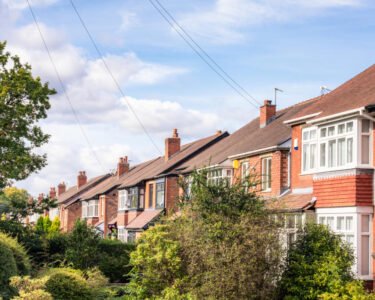Homeowners coming off fixed rate mortgages faced huge rises in their monthly payments, latest figures have revealed, with the costs severely biting into household disposable income.
With the Bank of England base rate rising to 5.25 per cent in the summer of last year, families faced soaring mortagage rates with the average two-year fixed rate reaching 6.9 per cent.
The new rates meant many homeowners, especially those with large mortgages still to pay, faced challenging increases in monthly payments.
Last year, more than 1.4m households in the UK had fixed rate mortgage up for renewal, with more than half coming off rates of less than two per cent.
Ken James, director at Contractor Mortgage Services, told The Independent that the change in payments meant some were forced to either extend their mortgages or even sell up and move elsewhere.
“And while they may have had money in previous years for a holiday or a new car, they are now having to hold back as their monthly mortgage payments rise,” he added.
The Office for National Statistics has published estimates on the impact of the rising mortgage rates for those impacted in 2023, breaking the figures down by region to calculate which areas were most exposed.
Which areas saw the biggest rise in monthly mortgage repayments
In Kensington and Chelsea, in London, the ONS estimates that the average increase in monthly mortgage payments for households impacted by rate changes was a jump of £1,193 to £5,100, the equivalent of more than £14,000 in a year.
The area was followed by Camden with a £924 monthly increase, Islington with a £803 rise and Hammersmith with a £776 increase. Outside London, homeowners in Elmbridge in Surrey saw their monthly mortgage payments rise by £456.
The huge increase in Kensington and Chelsea equated to 27 per cent of the disposable income for an average household in the area – however just six per cent of households were impacted by rate changes last year since they either rented, owned their homes outright, or had fixed mortgages.
Which areas saw the lowest rise in monthly mortgage repayments
Far from the capital, homeowners living in areas in the north of the country saw the lowest increases in mortgage payments.
In Allerdale, in Cumbria, the average increase in monthly payments was £80 to £453 in 2023. It was followed by Barrow-in-Furness, also in Cumbria, where homeowners saw an increase of £83 in monthly payments, then Copeland, also in Cumbria, and Stoke-on-Trent, which both saw a £87 rise.
Despite the lowest rise in payments, homeowners in Allerdale were among the most exposed in the country with the jump in costs equating to 17 per cent of a household’s disposable income.
In Allerdale, 13 per cent of households remortgaged last year.
Will mortgage holders coming off fixed rates in 2024 be equally affected?
The year 2024 started off with hopes homeowners faced a brighter picture with many lenders cutting their rates in January.
That was followed by top economists predicting the 5.25 per cent Bank of England base rate would fall in May, with two-year fixed mortgages rates dropping to nearly four per cent at the start of the year.
However, since then rates have risen. This week, five mortgage lenders increased their rates as inflation slowed less than expected in March. The central bank is using higher rates for longer to keep inflation under control.
This marked another blow for homeowners, with many coming off fixed rate mortgage set more than two years ago when costswere much lower.
Ken James, director at Contractor Mortgage Services, said he feared banks had jumped the gun at the start of the year.
“The banks took a little bit of a gamble by thinking the market was looking good and the base rate was going to be coming down [it remains at 5.25 per cent], because of that they started to bring in lower rates and we saw movement.”
He said the increase had “concerned” clients with some having to make difficult choices against rising monthly payments, such as extending their mortgage terms or even selling and moving home.
Some were looking to sell and go into rented accommodation, but then they faced rising costs again, said Mr James, who added: “I don’t see the situation changing for a while, I think people are prepared to wait out this difficult period and hope for better news in a couple of years’ time.”





